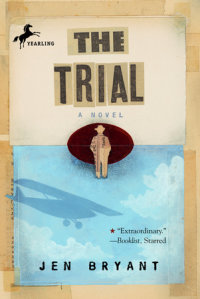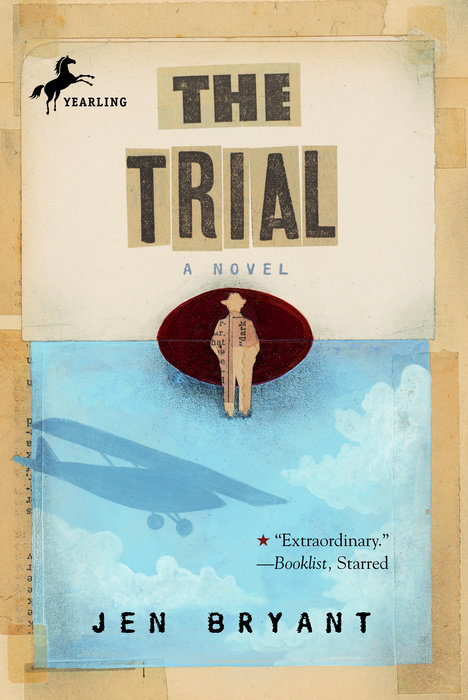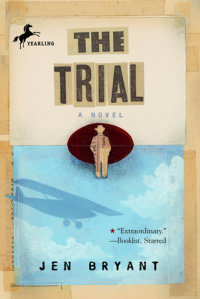The Trial
Imagine you are Bruno Richard Hauptmann, accused of murdering the son of the most famous man in America.
In a compelling, immediate voice, 12-year-old Katie Leigh Flynn takes us inside the courtroom of the most widely publicized criminal case of the 20th century: the kidnapping and murder of Charles Lindbergh’s baby son. And in doing so, she reveals the real-life figures of the trial—the accused, the lawyers, the grieving parents—and the many faces of justice.
An Excerpt fromThe Trial
FLEMINGTON
I’ve lived in this town my whole life
and I can tell you . . .
nothing ever happens.
Each week, the farmers bring their chickens and eggs to market
and the grain trucks dump and load up
at Miller’s Feed Store on North Main.
The streets are wide and clean,
the shop-keepers are friendly,
and all the children walk to school.
At Christmas, Santa comes to the bank and gives out
candy-stuffed stockings, and on Halloween
there’s a big parade at the courthouse
with cider and donuts
and prizes for the Prettiest, Funniest, and Scariest.
With all this, you’d think I’d be happy as a clam here in Flemington,
and why that’s not so,
I may never really know–
but I do know that whenever I read
National Geographic or Time
or look through one of my uncle’s travel books–
the ones with pictures of glaciers and deserts,
palm-treed islands and busy cities–
I’m always wishing myself
into them.
“You’re restless, Katie Leigh, just like your father was”
is Mother’s explanation, but since
he left us so long ago
I guess that’s another thing
I’ll never really know.
THE PHOTOGRAPH
From the photograph, we don’t
look a lot alike:
his hair dark brown
(mine is black),
his eyes hazel gray
(mine are dusky green),
his nose long and thin,
(mine small and wide, a few scattered freckles
along each side),
but then . . .
there’s that full lower lip
(I have that)
and his dimpled chin
( I have that too)
and the way his head tilts just a little to the left,
like he’s about to ask a question
or trying to get a different perspective
(Mother says I do this all the time).
I guess I believe he’s a part of me,
though I wish I had more
than a five-by-seven photo
to prove it.
AT THE RAILYARD
Sometimes I watch the train men turn engine,
watch the box cars unhitch and recouple,
watch the forklifts load the flatbeds
and the fireman shovel coal.
Sometimes I try to remember my father.
Sometimes, when there’s nothing else to do,
I stay all day until the last train leaves,
and all I can see is a thin line of steam,
way off in the distance.
SULLEN
At the tracks, I usually find Mike, his back against
the big wooden box
where the station master keeps his rain cape
and his tools.
We don’t talk much.
But once in a while, we talk
a lot.
Mike told me his mother died when he was five and his father
has been drinking too much
ever since.
On sunny days, I bring a book and read it while he
whittles oak sticks into animals
with his pocket knife,
or with his hands, shapes faces from
and pieces of clay.
When I bring leftovers from the kitchen
he tries to refuse, but when I
start chewing, he does too.
He borrows my books, and I know
he’s smart because
he asks me all these questions
about the characters
that I never thought about before,
and I have to go home and think on them
before I can answer.
Mike is not like
the other boys I know . . . he’s not
stuck-up or loud-mouthed or silly.
At school, he’s real quiet. He sits
in the back row so no one will notice
if he falls asleep
from staying up late waiting
for his father.
The teachers all say he’s “sullen,”
but if you tell him a good joke, he laughs
the kind of laugh that makes you join in,
makes you forget
your troubles.
Once, when he walked me home,
he stopped before the big blue house on the corner
to watch the family inside at supper:
the mother serving the soup, the father
carving the bread, the children chattering–
the neat white plates,
the yellow curtains on the windows,
the warm steam rising
from the bowls.
WHEN SOMETHING HAPPENED . . .
Actually, something did happen here
about two years ago–
not in our town exactly, but just
ten miles away, in Hopewell, N.J.
Something happened
on March 1st, 1932, between 7:30 and 10 pm,
at the home of Colonel Charles Lindbergh,
the first man to fly across the Atlantic Ocean
alone,
our bravest and greatest pilot, an American hero.
Something happened
on that stormy night,
as the wind howled outside his house on Sourland Mountain,
while the Colonel and Mrs. Lindbergh
were reading and sipping tea
and Wahgoosh, their terrier, laid curled at their feet.
Something happened
to the their little baby–Charles Lindbergh, Jr., just 20 months old–
while he was sleeping in his upstairs room,
while the butler was polishing silver
and the maid was doing dishes.
Someone climbed
into a second-floor window
and pulled Little Charlie out of his crib
and carried him outside to a ladder
and climbed down holding him
while the wind groaned and a car waited.
Someone kidnapped
Charles Lindbergh’s first-born son, leaving only
some muddy footprints,
a broken ladder,
and a ransom note.
And no one saw
who did it.


